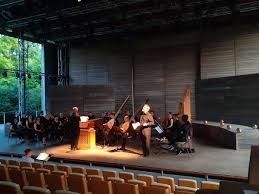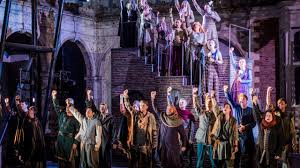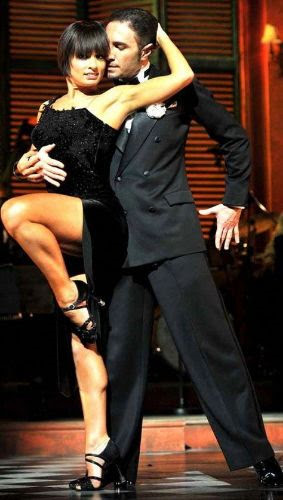Cadogan Hall presents its thirteenth Zurich International Orchestra Series with twelve concerts performed by eleven of the world’s most distinguished orchestras. This season sees five ensembles make their Cadogan Hall debuts, performances from international artists and contemporary music from female composers.
Britten-Shostakovich Festival Orchestra
As part of its inaugural tour, the newly formed Britten-Shostakovich Festival Orchestra, conducted by founding Artistic Director Jan Latham-Koenig, open the series. The ensemble, on a 7-date tour of the UK, is made up of young musicians from conservatoires from both countries: they perform music of their homelands, inspired by the great Cold War friendship between the two composers after whom the orchestra is named.
The orchestra’s only London date opens with Vaughan Williams’ Fantasia on a Theme by Thomas Tallis and closes with Shostakovich’s Hamlet Op.116a with actors Edward Fox and Freddie Fox. Pavel Kolesnikov is the soloist for Rachmaninov’s Rhapsody on a Theme of Paganini before the focus returns to the UK with Britten’s Four Sea Interludes from Peter Grimes (Wednesday 25 September 2019).
Mariinsky Orchestra and Valery Gergiev
The Mariinsky Orchestra and Valery Gergiev return to Cadogan Hall for a pair of concerts. They mark the 150th anniversary of Berlioz’s death with his Symphonie Fantastique and excerpts from Romeo and Juliet. Both dates feature a different soloist winner from the prestigious XVI International Tchaikovsky Competition: Gold Medal winner for Woodwind Matvey Demin performs Ibert’s Flute Concerto and Fantasy on Bizet’s Carmen by Borne. Silver Medal winner for Piano Mao Fujita plays Tchaikovsky’s Piano Concerto No. 1. Excerpts from Rimsky-Korsakov’s Mlada as well as The Legend of the Invisible City of Kitezh and the Maiden Fevroniya complete each programme (Monday 7 & Tuesday 8 October 2019).
All-Russian Programmes
Alexandra Dariescu joins the Moscow Philharmonic Orchestra for Rachmaninov’s much-loved Piano Concerto No. 2. Conducted by Yuri Simonov, ballet music permeates the rest of the programme with Tchaikovsky’s Romeo and Juliet Fantasy Overture, as well as excerpts from Swan Lake and Khachaturian’s Gayane (Thursday 10 October 2019).
In its series debut, the Siberian Symphony Orchestra conducted by Dmitry Vasiliev, open their concert with Shostakovich’s Festive Overture. Freddy Kempf makes a welcome return to Cadogan Hall to perform Rachmaninov’s Piano Concerto No. 3 before Tchaikovsky’s Symphony No. 4 closes the programme (Thursday 23 April 2020).
In a celebration of Prokofiev and Tchaikovsky, the St Petersburg Symphony Orchestra is joined by Jennifer Pike for Tchaikovsky’s Violin Concerto. Tchaikovsky’s Symphony No. 5 and excerpts from Prokofiev’s Cinderella Suite bookend the concert, which is conducted by Nikolai Alexeev (Wednesday 27 May 2020).
Contemporary Music
The Iceland Symphony Orchestra with conductor Yan Pascal Tortelier perform Aereality, the work written for them by fellow Icelander Anna Thorvaldsdóttir. Premiered in November 2011, it was nominated as Composition of the Year at the Icelandic Music Awards in 2012 and portrays the state of gliding with nothing to hold onto, as if flying. The music explores both the feeling of absolute freedom and unease gained from the lack of attachment. Also making up their debut programme at Cadogan Hall is Bizet’s L’Arlésienne Suite No. 2, Ravel’s jazzy Piano Concerto for the Left Hand with Yeol Eum Son, as well as excerpts from Prokofiev’s Romeo and Juliet (Monday 10 February 2020).
The Brussels Philharmonic and conductor Stéphane Denève return to close the series. Anna Clyne’s This Midnight Hour, which premiered in November 2015, opens the concert and is inspired by poetry as well as the character and power of the lower strings of L’Orchestre national d’Île-de-France. Following this, Jean-Yves Thibaudet is the soloist in Liszt’s Piano Concerto No. 2 before the final work: Mahler’s epic Symphony No. 1 (Thursday 11 June 2020).
Other International Artists
Guitarist Miloš Karadaglic brings Spanish repertoire to Cadogan Hall with Flanders Symphony Orchestra under José Luis Gomez. The programme opens with Rossini’s The Barber of Seville Overture and continues with music by Rodrigo, Villa-Lobos, de Falla and closes with Bizet’s Carmen Suite (Wednesday 30 October 2019).
Mezzo-soprano Ester Pavlu is the soloist with Prague Symphony Orchestra in Mahler’s Symphony No. 3, often referred to has his hymn to the natural world. Pietari Inkinen conducts. (Tuesday 12 November 2019).
Eric Lu performs Beethoven’s Piano Concerto No. 4, the work with which he won the 2018 Leeds International Piano Competition and has subsequently released on Warner Classics to great acclaim. Orchestre National de Lille make its Cadogan Hall debut under the baton of Alexandre Bloch and completes the all-French programme with Ravel’s Ma mère l’Oye Suite and La Valse as well as Debussy’s La Mer (Wednesday 29 January 2020).
Both performing for the first time at Cadogan Hall, the Swedish Philharmonia are joined by violinist Viktoria Mullova for Prokofiev’s Violin Concerto No. 2, conducted by Jaime Martín. The other two works are Mendelssohn’s Symphony No. 5 ‘Reformation’ and Sibelius’ Symphony No. 5 (Friday 13 March 2020).
 Garsington Opera at Wormsley, 25 July 2019
Garsington Opera at Wormsley, 25 July 2019


